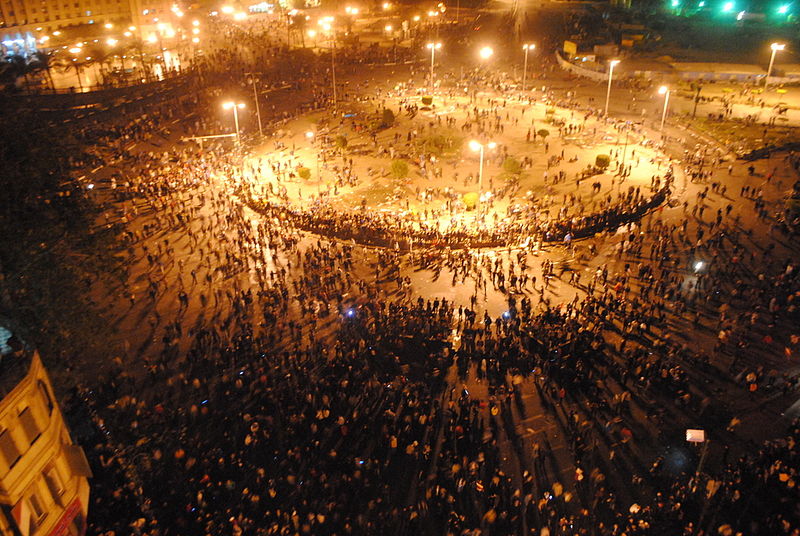Of Egyptians, For Egyptians
 It is a great mistake to suggest simplicity when an issue is obviously complex. Time magazine’s July 9 cover story on the state of Egypt’s rulers boasts the simple and suggestive headline, “The Revolution That Wasn’t.” But while this headline is provocative, it is not nuanced, and it is misleading. The Egyptian revolution very much was. We may be collectively worried about the stability of Egypt’s fledgling democracy, but this is a normal and expected concern. It is part of the process of democratization. But it is a mistake to confuse our anxiety with a suggestion that the Egyptian revolution has failed.
It is a great mistake to suggest simplicity when an issue is obviously complex. Time magazine’s July 9 cover story on the state of Egypt’s rulers boasts the simple and suggestive headline, “The Revolution That Wasn’t.” But while this headline is provocative, it is not nuanced, and it is misleading. The Egyptian revolution very much was. We may be collectively worried about the stability of Egypt’s fledgling democracy, but this is a normal and expected concern. It is part of the process of democratization. But it is a mistake to confuse our anxiety with a suggestion that the Egyptian revolution has failed.
If we look closely at where Egypt currently stands, it will become all too apparent that the Egyptian revolution is doing just fine. It is true that the military dissolved the parliament; that a Muslim Brotherhood Islamist has become president who, among other things, vowed to free a terrorist; and that the young secularists who led last January’s revolution are nowhere to be found in the governing parties. This is all true, and it’s easy to be anxious about all this.
But what else could have happened? The secular young leaders in Tahrir Square do not represent Egypt’s historic majorities, and it would be foolish to underestimate or undervalue the influence these other majorities should have in the new government. These majorities, in fact, are largely represented by the two groups currently vying for power—the military junta and the Muslim Brotherhood. Representative of the populace, these are the two factions that should be in control. It makes sound democratic sense.
An inside look at the military authority, the highlight of Time’s cover piece, dispels some of the notions we have come to foster overseas. The piece notes, importantly, that the military is made up of conscripts from every Egyptian’s family; as such, it is in fact Egypt’s most representative institution. The chairman of the Supreme Council of the Armed Forces (SCAF), Field Marshal Mohamed Hussein Tantawi, decides the junta’s prerogatives by majority vote, not decree. He is hated only, and also reasonably, because of his proximity to the Mubarak regime.
General Anan, his second in command, speaks to the chair of the House Rules Committee “at least once every three days.” This is no tyrannical, abstruse entity. The Egyptian generals’ consultant in Washington commented to Time, “They’re trying to do the right thing. They’re not plotting everything out.” Yes, they will make mistakes and take missteps. But their presence and power is understandable and respectable.
The Muslim Brotherhood, and the new president, is also largely representative of Egypt’s populace and the people’s wishes. The Council on Foreign Relations notes that 51.7 percent of those who voted chose Morsi; by no means is this number an illegitimate margin of victory. And the Brotherhood? Their history is complex, and they have flirted with violence more than once in the past. But as CFR’s Steven Cook writes, “to be sure, the Brotherhood espoused a pan-Islamic message at times, but at a basic level, the Brothers are good nationalists.” And good nationalists are exactly what Egypt needs as it forms its nation anew.
Referring to the newly elected president’s inauguration speech, the head of the Egyptian Federation for Human Rights said that Morsi “wanted to show that he is not head of any specific faction, but a president for all Egyptians. But there must be actions to follow, on the ground.” And, to this end, the “Morsi-meter” has been activated by a number of Egyptian activists to keep track of Morsi’s accountability. But criticism of Morsi is unfounded at this point. The military has enabled him to gain power, and he has said the right things in terms of Egypt’s international treaties and his own attempt to rule for all Egyptians. There is reason to celebrate.
Of course, the picture is not entirely pretty. The military leaders have dissolved the elected parliament, and it is widely thought that Morsi is fighting behind closed doors to hold onto whatever power the military is allowing the office of the president. But this revolution is recent, and this democracy is young. There has to be some conflict between the leading parties. And we can find solace in the fact that these leading parties represent the Egyptian people. As long as they do that, they are upholding the values of the revolution.
As long as Egypt’s political situation remains fragile and dirty, Americans will be tempted to deem the revolution a failure. But this entirely misses the point of the revolution, of the Arab Spring as a whole. In The Invisible Arab, an agonizingly opinionated but important and honest book on the Arab Spring, Al-Jazeera journalist Marwan Bishara makes a powerful statement that we often take for granted. “The Arab Spring,” he writes, “is exclusively Arab.” It is not American. It does not abide by American rules, and it does not hold to American values. It should not be expected to, and it doesn’t have to. This is the beauty of all that we have witnessed. As Morsi rises to power, we must continue to do our part and witness, not judge, and hope to see a stable Arab future.
